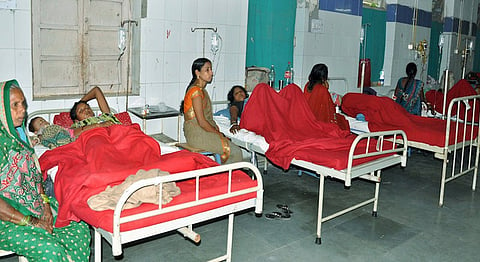
- HOMEGROWN WORLD
- #HGCREATORS
- #HGEXPLORE
- #HGVOICES
- #HGSHOP
- CAREERS
- ABOUT US
- CONTACT US

In the ‘70s, Indira Gandhi infamously forced mass sterilization programmes with money from the World Bank, the UN and Swedish International Development Authority to back her hare-brained scheme.
The deaths from the programme resulted in a range between 300 to thousands, while 8 million people were sterilized over the course of 1976, with specific targets being the poor, lower castes and ethnic minorities.
According to the Guardian, state governments competed to beat targets and villagers recalled being forced into mass sterilization by armed police. It’s safe to say that with that initiative, future family planning initiatives were kept at bay out of fear ever since.
Now, a clinic in Ellis Nagar, Tamil Nadu, is providing family planning services to residents (especially women) to encourage more equity in family planning between men and women.
In a statistical report by the Ministry of Health and Family Welfare, more than 4 million women have been sterilized in the course of 2014-2015, a stark difference to 90,000 men who got vasectomies.
More than 1,434 people died from similar procedures through the course of 2003-2012, majority of whom were women. A combination of fear, and social stigma has made it possible for India’s family planning programs to be geared disproportionately towards women, keeping men away from the clinics.
In a telling moment at Ellis Nagar Clinic, “Men are the workers in the family. They need to go and work. It’s better for us to do the operation,” says Chitra, a woman outside the clinic. “We believe that men lose their strength by having it done.”
This idea of tying masculinity and power displaying warped ideas of emasculation is a driving factor behind many men refusing to engage with family planning, despite the need for India’s parents, both male and female, to engage. In a previous article, we spoke about how informed consent and educated choices were the living privilege of India’s upper class, and how family planning initiatives have often been targeted at the poor and uneducated, leading them to make unsafe and dangerous choices in regards to reproductive health.
With a lack of knowledge about condoms, birth control and its usages, and the stigmas that come along with using them, the situation at Ellis Nagar provides a relieving narrative, one where women are voluntarily taking control of their bodies and making their own reproductive decisions.
According to the Guardian, up to 20 women undergo the operation every day in Madurai. In fact, it has come to a point where sterilization for women has become a rite of passage, who often come there straight after delivery.
In Newstoday, one woman, Muneshwari added, “We do it by our own will - the government doesn’t force us. Mostly I did it because it is so expensive to have children. The cost of educating them, looking after them - everything is expensive.” Another reason for the sterilization process is monetary compensation. Women are given Rs. 500 when sterilized, men are given Rs. 1300.
Currently, only 5% of sterilizations are performed on men, but the government is hoping to raise this to 30% under a national health policy. A ministry spokesperson added “The idea is that men and women must equitably share the responsibility of planning or spacing the birth of children.” These family planning campaigns will be targeted at 10 of India’s poorest states including Odisha, Bihar and Uttar Pradesh.
Feature Image Courtesy of The Huffington Post
